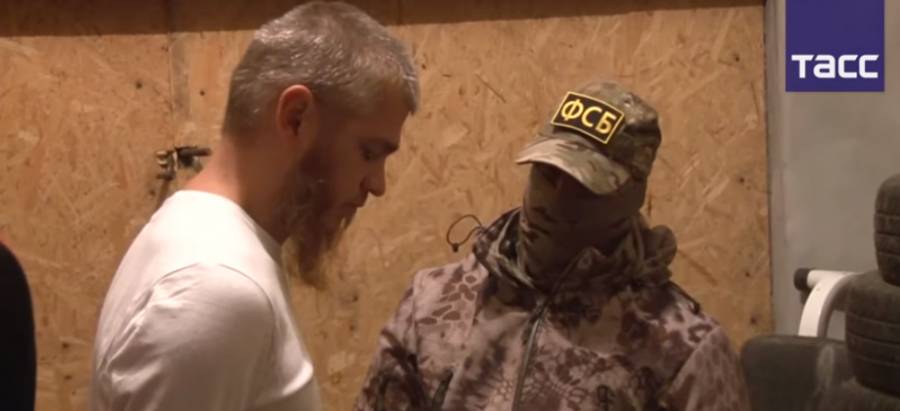• Topics / Human Rights Abuses in Russian-occupied Crimea
New weapon of religious persecution and arrests in Russian-occupied Crimea

Three Crimean Tatars have been remanded in custody and a fourth placed under house arrest in a new chilling offensive in Russian-occupied Crimea which has prompted Said Ismagilov, Head of the Spiritual Directorate of Muslims in Ukraine to ask if the occupiers “hunt Muslims in Crimea like on safari”. The armed searches of four homes on October 2 had scarcely ended when Russian state-controlled media began reporting, with embellishments, claims by a member of the occupation regime, that three ‘cells’ of Tablighi Jamaat had been ‘eliminated’.
The reality was, as usual, quite different. There were no ‘cells’, just four devout Muslims, the oldest aged 64 and in poor health, who were taken prisoner after armed and masked men burst into their homes early on Thursday morning.
The four men are accused of involvement in the apolitical and peaceful Tablighi Jamaat movement which Russia banned as ‘extremist’ in 2009. According to RIA Novosti, the Russian Supreme Court asserted that Tablighi Jamaat’s activities were aimed at “violating Russia’s territorial integrity and discriminating against citizens of Russia on religious grounds, as well as showing support for international terrorist organizations”.
If any evidence was provided, it was not made widely known. Researchers from the authoritative Chatham House institute had virtually nothing to say about the movement in their 2014 report Transnational Islam in Russia and Crimea. They noted only that “Russia has pursued a consistent policy in dealing with non-traditional forms of Islam: they are all essentially treated as a security threat”, and mentions Tablighi Jamaat as one of the Islamic organizations with transnational connections which have been banned.
Nor has any evidence been provided to substantiate the claim that any of the men are members of Tablighi Jamaat, or were organizing a so-called ‘cell’. This was of no concern to ‘judge’ Viktor Mozhelyansky, who has become notorious for his role in politically-motivated prosecutions since Russia’s invasion of Crimea.
64-year-old Talyat Abdurakhmanov, 48-year-old Renat Suleymanov and Arsen Kubedinov, father of four small children, were all remanded in custody until November 29. Seiran Mustafaev was, at the investigator’s suggestion, only placed under house arrest. He is also the only one of the four men who has an officially appointed ‘lawyer’, not a lawyer whom he or his family chose. Such appointed lawyers generally do what the investigator wants, and their role is often merely to persuade the person to ‘confess’.
It may therefore be of significance that the Crimean Muftiat reportedly agreed to help the detained men (at the request of relatives of one of them) if they reject ‘biased’ lawyers and accept guilt, and a representative of the Muftiat turned up at the FSB offices at 5 p.m. on the day the men were detained.
Lawyer Edem Semedlyaev reported on Thursday morning that all the men had been put under pressure to ‘cooperate’ with the prosecution in exchange for a lesser sentence. This has also become standard practice in occupied Crimea, with such ‘testimony’ being used to obscure the lack of any real evidence.
Semedlyaev also reports that his client Renat Suleymanov had his voice recorded, with this almost certainly meaning that he had earlier, properly illegally, faced wiretapping or similar.
All four men are charged under Article 282.2 of Russia’s criminal code.- ‘organization of an extremist society’. The punishment ranges from a steep fine to ten years imprisonment. While this is the first such case in Crimea under Russian occupation, Grani.ru reports that several people have received real prison terms for supposed involvement in Tablighi Jamaat in Russia.
19 Crimean Muslims have either been convicted or are indefinitely detained on charges of involvement in Hizb ut-Tahrir, a peaceful pan-Islamist movement which has never committed a terrorist act anywhere in the world, but which Russia’s Supreme Court decreed should be considered ‘terrorist’.
In many of the so-called ‘Hizb ut-Tahrir’ cases, it seems likely that the men were targeted for their human rights or civic activities, or because of religious views or practice viewed unfavourably by the Mufti who now collaborates with Russia.
Said Ismagilov believes that the occupation regime has launched a new offensive against Muslims.
“I’d be interested to known whether the punisher – occupiers are going for Muslims in Crime, like on a safari. Like they’re hunting? They weren’t showing any resistance, don’t flee or go into hiding, they’re totally defenceless. Why they are behaving like this and terrifying children and the families? This is pure religious persecution”.





